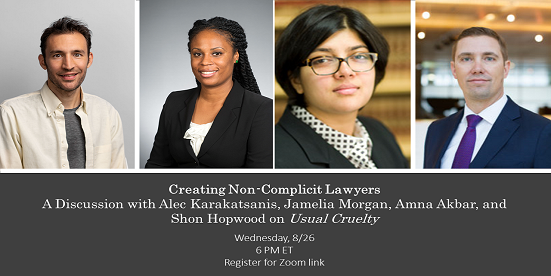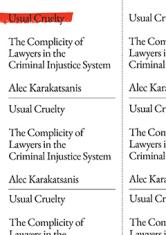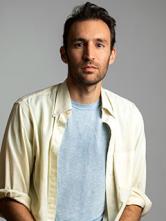
This event will be streamed live on The New Press Youtube Channel: https://youtu.be/ReyhPUi0DwM
We're living through a time of unprecedented public support for changing our legal system, with protesters across the United States fighting for everyone to be treated equally under the law. But how does the law shape our own thinking in what constitutes a crime — and what role do lawyers have in perpetuating an unjust system? For example, it is a crime in most of America for poor people to wager in the streets over dice; dice-wagerers can be seized, searched, have their assets forfeited, and be locked in cages. It’s perfectly fine, by contrast, for people to wager over international currencies, mortgages, or the global supply of wheat; wheat-wagerers become names on the wings of hospitals and museums.
Alec Karakatsanis, Amna Akbar, Jamelia Morgan, and Shon Hopwood will discuss how students and lawyers can fight back against our system of mass human caging.
“Passionately argued. . . . Karakatsanis sets out the moral and political philosophy that drives his work—that criminal law, and the manner in which it is selectively enforced, is a reflection of ‘power, racial bias, and economic self-interest.’ His vision is radical: a post-carceral society, in which imprisonment is ‘a narrowly tailored remedy of last resort.’” —The New Yorker
“Alec Karakatsanis asks a difficult question: What do we do when defense attorneys, prosecutors, judges, legislators, and our fellow citizens make the most profound of injustices possible? The question is a worthy one. If to be sworn to uphold the law is not enough, to read this book, too, is simply not enough. May action follow.” —Reginald Dwayne Betts, poet, lawyer, and author of the poetry collection Felon
“There is no better way to understand vital and often successful challenges to the system, and to the dehumanization of individuals that permits it, than to read this searing, searching, and eloquent book by Alec Karakatsanis.” —Martha Minow, former dean, Harvard Law School, and author of When Should Law Forgive?
This event is made possible by The Unusual Fund, which will pay for copies of Usual Cruelty to be given free to high school, college, and law students in any class in which a teacher or professor assigns it, while supplies last. And, for every free book that is provided to a student, a matching copy will be sent to someone incarcerated in a prison or jail. For more information on adopting the book and receiving free copies, please email jgupta@thenewpress.com.
Speaker bios:
A former public defender, Alec Karakatsanis is the founder of the Civil Rights Corps, an organization designed to advocate for racial justice and bring systemic civil rights cases on behalf of impoverished people. He was named the 2016 Trial Lawyer of the Year by Public Justice and was awarded the Stephen B. Bright Award for contributions to indigent defense in the South by Gideon’s Promise.
Jamelia Morgan is Associate Professor of Law and Robert D. Glass Scholar at the University of Connecticut School of Law, where she teaches and writes on issues related to race, gender, disability, policing, and the carceral state. Prior to joining the faculty at UConn, Professor Morgan was a civil rights litigator at the Abolitionist Law Center and worked to improve prison conditions and end the use of solitary confinement in Pennsylvania state prisons.
Amna Akbar is Associate Professor of Law at Ohio State University's Moritz College of Law. She writes broadly for academic and popular audiences, in outlets like NYU Law Review, UCLA Law Review, NOMOS, Citizenship Studies, the Journal of Legal Education, Law and Political Economy, the Nation, Boston Review, and more.
Shon Hopwood is Associate Professor of Law at Georgetown Law. His legal scholarship has been published in the Harvard Civil Rights-Civil Liberties, Fordham, and Washington Law Reviews, as well as the American Criminal Law Review and Georgetown Law Journal’s Annual Review of Criminal Procedure.


